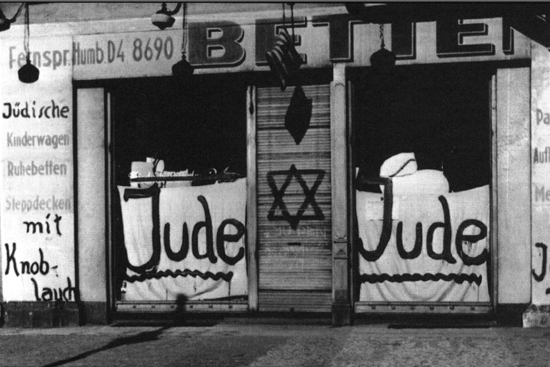Final Sale
Hillel House exhibit focuses on Jewish businesses in Nazi Berlin

Final Sale: The End of Jewish Businesses in Nazi Berlin offers a glimpse of how Jewish businesses were destroyed by Nazi economic racism. Photo courtesy of Stiftung Neue Synagoge Berlin—Centrum Judaicum
Approximately 160,000 Jews lived in Berlin when the Nazis rose to power in 1933, and 40,000 of them owned businesses. Throughout the next decade, they were stripped of their livelihoods. First came nonviolent, economic sabotage—the Nazi Party cut their connections with non-Jewish business owners, blocked their channels of supply and service, and gained the support of chambers of commerce throughout the city. Systematic violence followed, with pogroms that attempted to cripple not just Jewish business owners but the entire Jewish community.
Final Sale: The End of Jewish Owned Businesses in Nazi Berlin, an exhibit now on display in the Rubin-Frankel Gallery at the Florence & Chafetz Hillel House, sheds light on the racist business environment that the Nazis fostered to destroy Jewish businesses through intimidation, crippling laws and regulations, embezzlement, theft, and violence. The exhibit is on view through the week of January 5.
Jonathan Zatlin, a College of Arts & Sciences associate professor of history and one of the exhibit’s organizers, stresses that while focusing on Nazi genocide is important, it is just as vital to explore how Nazi anti-Semitism flourished, moving from low-level economic discrimination into a comprehensive set of laws that prevented Jews from participating in German society.
During the November 1938 pogrom known as Kristallnacht, Nazi paramilitary henchmen and non-Jewish civilians destroyed and plundered Jewish businesses in Berlin and throughout Germany and Austria. A law was passed that prohibited Jews from owning or operating businesses and that transferred the ownership of Jewish businesses to non-Jews. “The Nazis thought they were liberating Germany from Jews and liberating property from Jewish hands,” Zatlin says. “So, they thought they were doing something good, which is really frightening.”
By 1941, Zatlin says, none of the city’s businesses were owned by Jews. “The Nazis were really trying to get rid of Jews, and they started doing it culturally and politically, but they were also always doing it economically,” he says. “They wanted to get rid of them. And when the ones who were left refused to leave, the Nazis got violent.”
The exhibit, presented by the Elie Wiesel Center for Judaic Studies, focuses on a small but diverse sample of Jewish businesses that operated in Berlin during the rise of the Nazis and on the effect of Nazi policies on individual lives. “The personal anecdotes can be a very powerful way for the people to enter into the history,” Zatlin says.
One of the seven featured businesses is Yva Photographic Studio, which was owned by fashion and commercial photographer Else Ernestine Neuländer (known as Yva). Yva opened her studio in Berlin in 1930. But Nazi campaigns and legislation soon made life difficult. Models refused to work with her, and she eventually had to give the studio to a non-Jewish friend before it shut down entirely in 1938. By 1942, Yva and her husband were arrested by the Gestapo and sent to the concentration camp at Sobibór, where they perished. Zatlin says that Yva has not received enough attention as a significant figure in the world of fashion photography and a trailblazer for women in business.
The exhibition also highlights the case of Moritz Fröhlich, the owner of Fröhlich & Pelz Glass–Crystal–Porcelain. Fröhlich took on a non-Jewish business partner, Kurt Pelz, in 1934 in an attempt to protect his business from the Nazis, but by 1938, Pelz had forced Fröhlich out, without compensation. Fröhlich and his family were secular Jews with strong German loyalties, but in the face of Nazi abuse, they left Germany in 1939 on the Iberia, the last ship that successfully brought Jewish refugees to the United States. Fröhlich’s son, Peter Gay, is an eminent historian and a Yale University professor emeritus.
“There is this way in which they think that they’re German, and suddenly they’re being told that they’re not, and this has consequences for their business,” Zatlin says. “The other thing that’s rather shocking is they barely got out, and we wouldn’t have had Peter Gay if they hadn’t. How many people didn’t get out who would have been like Peter Gay?”
Zatlin hopes that Final Sale will prompt members of the BU community to think about the ways racism affects American society today. “I am interested in having different kinds of people think more broadly about this issue and come together around it as way of both combating it as a social evil and thinking about it historically,” he says. “Americans like to think of themselves as great egalitarians. We love diversity and we fought this wonderful, just war against the Nazis, who were the ultimate racists. If our identity is really contingent on that notion of having fought the Nazis in this just war, why is it that we’re able to tolerate certain social arrangements that promote, reinforce, or don’t change racist arrangements, especially within the economy? I think it’s really important to try to make these issues relevant to each generation.”
Final Sale: The End of Jewish Businesses in Nazi Berlin is on exhibit in the Rubin-Frankel Gallery at the Florence & Chafetz Hillel House, 213 Bay State Rd., until the week of January 5. The exhibit is free and open to the public. The gallery is open Monday through Saturday, 9 a.m. to 9 p.m. and Sunday from 3 to 9 p.m. Information about the exhibit is here.
Samantha Pickette can be reached at pickette@bu.edu.
Comments & Discussion
Boston University moderates comments to facilitate an informed, substantive, civil conversation. Abusive, profane, self-promotional, misleading, incoherent or off-topic comments will be rejected. Moderators are staffed during regular business hours (EST) and can only accept comments written in English. Statistics or facts must include a citation or a link to the citation.